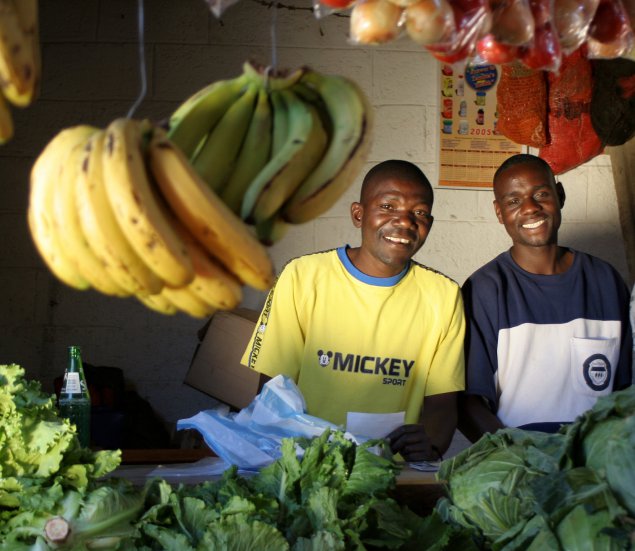The Global Alliance for Improved Nutrition (GAIN), will host
the first-ever Nutrition on Africa Investor Forum (NAIF) in Nairobi,
Kenya, on October 16-17, it has been announced.
the first-ever Nutrition on Africa Investor Forum (NAIF) in Nairobi,
Kenya, on October 16-17, it has been announced.
The aim of the forum is to bring together to and engage private
sector investors to play a key role in improving nutrition across
Africa. The event is hosted in partnership with Royal DSM, a
purpose-led global science-based company in nutrition, health and
sustainable living recognized for its global fight against malnutrition,
the SUN Business Network and African Business magazine.
sector investors to play a key role in improving nutrition across
Africa. The event is hosted in partnership with Royal DSM, a
purpose-led global science-based company in nutrition, health and
sustainable living recognized for its global fight against malnutrition,
the SUN Business Network and African Business magazine.
The Nutrition Africa Investor Forum will highlight business
opportunities in a largely underdeveloped market. From farm to fork,
nutrient gaps in diets within low and middle-income markets constitute a
largely untapped market worth USD$120bn. According to a recent
study, no African country is expected to reach the UN target of ending
childhood malnutrition by 2030. In fact, malnutrition indicators remain
“persistently high” in 14 countries, stretching across from Sahel from
Senegal in the west to Eritrea in the east.
opportunities in a largely underdeveloped market. From farm to fork,
nutrient gaps in diets within low and middle-income markets constitute a
largely untapped market worth USD$120bn. According to a recent
study, no African country is expected to reach the UN target of ending
childhood malnutrition by 2030. In fact, malnutrition indicators remain
“persistently high” in 14 countries, stretching across from Sahel from
Senegal in the west to Eritrea in the east.
This challenge needs to be addressed. GAIN argues engaging the private
sector is key in addressing this issue. Nutrition-sensitive capital
investments along the entire food value chain are critical to drive
better availability, access, affordability — and finally — consumption
of nutritious foods.
sector is key in addressing this issue. Nutrition-sensitive capital
investments along the entire food value chain are critical to drive
better availability, access, affordability — and finally — consumption
of nutritious foods.
GAIN, an international organisation founded by the Bill and Melinda
Gates Foundation and driven by the mission of a world without
malnutrition, works with nearly 1,000 companies across the food value
chain in Africa, but many of these cite access to capital as a
challenge. At the Forum, experts will present a number of viable
investment opportunities from these enterprises to venture capital
funds, private equity groups, finance institutions, foundations and
impact investors. The forum will showcase current and future investment
potential for nutritious foods in Africa. There will also be an
opportunity for the private sector and investors to discuss key
challenges and discuss opportunities for unlocking greater investment in
nutrition market with the instruments and vehicles that are currently
available and those under development.
Gates Foundation and driven by the mission of a world without
malnutrition, works with nearly 1,000 companies across the food value
chain in Africa, but many of these cite access to capital as a
challenge. At the Forum, experts will present a number of viable
investment opportunities from these enterprises to venture capital
funds, private equity groups, finance institutions, foundations and
impact investors. The forum will showcase current and future investment
potential for nutritious foods in Africa. There will also be an
opportunity for the private sector and investors to discuss key
challenges and discuss opportunities for unlocking greater investment in
nutrition market with the instruments and vehicles that are currently
available and those under development.
Lawrence Haddad, GAIN’s Executive Director, says: “One in three people
in the world suffers from some form of malnutrition. Moreover, poor diet
is the number one risk factor in the global burden of disease. We
believe in the enormous potential of national food businesses in Africa
to address this challenge by producing more affordable, nutritious
foods. However, for this to happen new private investments must be
unlocked for SMEs along with new policy and lending instruments. We’re
aiming to help bridge this gap.”
in the world suffers from some form of malnutrition. Moreover, poor diet
is the number one risk factor in the global burden of disease. We
believe in the enormous potential of national food businesses in Africa
to address this challenge by producing more affordable, nutritious
foods. However, for this to happen new private investments must be
unlocked for SMEs along with new policy and lending instruments. We’re
aiming to help bridge this gap.”
Fokko Wientjes, Vice President Malnutrition Programs & Partnerships
Royal DSM and member of the SUN Business Network Executive Committee,
added: ‘Nutrition is the new asset class of a dynamic African food
industry. Businesses, governments and investors don’t just have a moral
case for investing in nutrition – they now have a business case too.
Businesses in Africa adapt their approach as governments and consumers
increasingly demand access to safe, affordable nutritious foods. Smart
companies and investors will start building now the African food
industry of the future, serving the African consumer of the future’.
Royal DSM and member of the SUN Business Network Executive Committee,
added: ‘Nutrition is the new asset class of a dynamic African food
industry. Businesses, governments and investors don’t just have a moral
case for investing in nutrition – they now have a business case too.
Businesses in Africa adapt their approach as governments and consumers
increasingly demand access to safe, affordable nutritious foods. Smart
companies and investors will start building now the African food
industry of the future, serving the African consumer of the future’.





